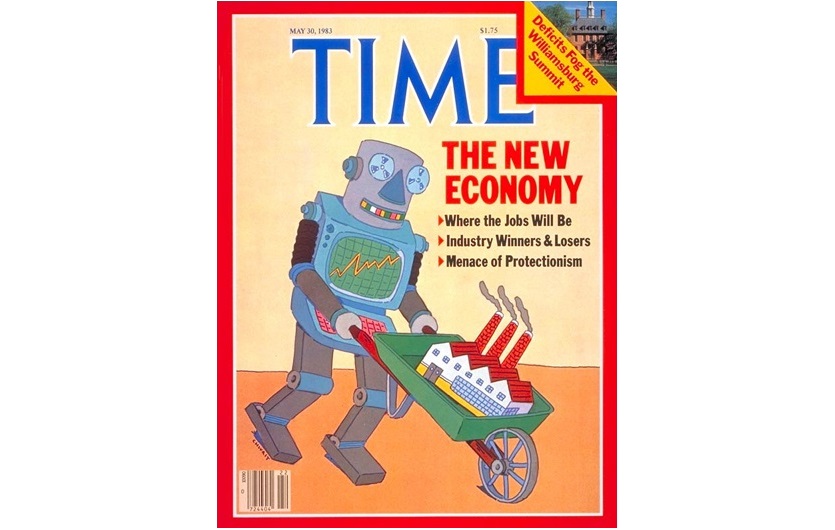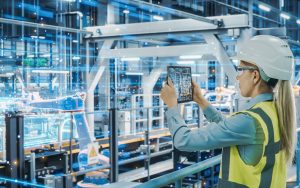In 1983, the Times magazine cover depicted a robot carting a factory off on a wheelbarrow and announced the article entitled: The new economy. The article was devoted to future predictions in the time of a recession and bankruptcies in heavy industry, prophesying a reduction in blue-collar jobs. It was a time when the industry of new technologies, as exotic as microelectronics, laser, genetic engineering, was emerging; completely new areas of development were coming into existence, as in the case of Apple, which was just then transforming from a garage company into a powerful corporation. Concerns were rising about the development of automation and the possibility of replacing entire sectors of workplaces, thus far controlled by man, with robots or automatic machines.
But after all, man has been afraid of automation since the launch of the first machines. We have heard of the destruction of machinery in factories in the early 19th century; it was a well-organised movement of the so-called Luddites who were protesting against the changes in the way of their life and the threats posed by the invention and application of weaving machines. Night attacks on the weaving plants, the destruction of machinery or the intimidation of people did not reverse the industrialisation process, similarly as the ban on using pneumatic paint sprayers by factory workers imposed by the American trade unions almost a century later. Nevertheless, it clearly showed that fear of the new has and will always accompany man, irrespective of the times they live in.
However, figures say that the mechanisation of production led to a sharp increase rather than a decrease in the number of jobs. For example, in the USA, 140 thousand people worked in the motor vehicle industry in 1910, while in 1920, as mechanisation was progressing, the number of jobs increased up to 250 thousand, and in 1930 there were as many as 380 thousand people working in this sector.
Following the publication of the article “The Future of Employment: How susceptible are jobs to computerisation?” by Carl Frey and Michael Osborn in 2013, the app WILL ROBOTS TAKE MY JOB? was even created and it has been working up until today to tell you how likely it is that your position will be replaced by robots. Are you a computer system analyst? – today, the likelihood that your position will be replaced by a robot is extremely low, amounting to 0.7%. At the same time, the purchasing manager position, meaning the tasks of an employee in the procurement department of a large company, already has a 98% risk, with a further 59% increase in the next two decades. But the risk of an analyst being replaced will increase by 32% over the next 20 years The article predicted that the low risk of job computerisation concerns only one in three workers, mainly those employed in education, health care, artists, managers at different levels and, of course, IT professionals.
But will this perspective look the same in a few years’ time?
As we have mentioned, fear of automation is not new. Today, as a result of automation, certain groups of employees are being made redundant, but, at the same time, new jobs are being created (often paid better than the ones that were lost), and usually, with the exception of the difficult transition period, the situation is improving.
Let’s consider machine learning and robotics, which find ways of doing the same things better, faster and cheaper and for which people with specific competencies were employed for decades. In the event of such a specific replacement, employees are moved to other roles. And again, as in the case of the industrial revolution, it is rather unlikely that the transition period will be painless. Time will be needed for people to retrain and for managers to reinvent roles for the freed workforce. And they have much less time than they had a century ago. Changes are taking place faster than ever and have a much wider reach.
In conclusion, let’s return to the Time’s article. A quote from 1950 was cited there. It is the opinion of John Diebold, a management consultant from New York: “At various times, usually at the depth of a recession, people have said it was going to be horrible from here on because of automation. But a couple of years later, it’s all forgotten. Certain types of jobs die, and others grow. That is the sign of a healthy economy”. There’s nothing to add, despite 71 years…
Source: Will Robots Take My Job, Strach przed automatyzacją (Fear of Automation), https://en.wikipedia.org/wiki/Luddite, (TIME) The new economy






